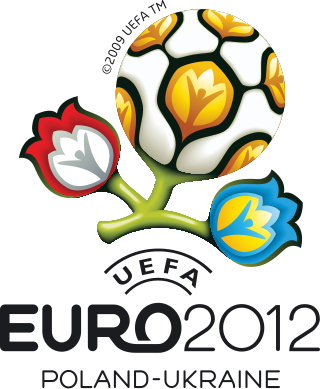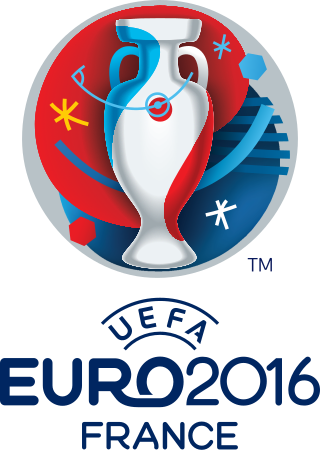
The UEFA European Football Championship, less formally the European Championship and informally the Euro, is the primary association football tournament organised by the Union of European Football Associations (UEFA). The competition is contested by UEFA members' senior men's national teams, determining the continental champion of Europe. It is the second-most watched football tournament in the world after the FIFA World Cup; the Euro 2016 final was watched by a global audience of around 600 million. The competition has been held every four years since 1960, except for 2020, when it was postponed until 2021 due to the COVID-19 pandemic in Europe, but kept the name Euro 2020. Scheduled to be in the even-numbered year between FIFA World Cup tournaments, it was originally called the European Nations' Cup before changing to its current name in 1968. Since 1996, the individual events have been branded as "UEFA Euro [year]".

The 2000 UEFA European Football Championship, also known as Euro 2000, was the 11th UEFA European Championship, a football tournament held every four years and organised by UEFA, the sport's governing body in Europe.

The 2008 UEFA European Football Championship, commonly referred to as UEFA Euro 2008 or simply Euro 2008, was the 13th UEFA European Championship, a quadrennial football tournament contested by the member nations of UEFA. It took place in Austria and Switzerland from 7 to 29 June 2008.

The 2012 UEFA European Football Championship, commonly referred to as UEFA Euro 2012 or simply Euro 2012, was the 14th European Championship for men's national football teams organised by UEFA. The final tournament, held between 8 June and 1 July 2012, was co-hosted by Poland and Ukraine, and was won by Spain, who beat Italy in the final at the Olympic Stadium, Kyiv, Ukraine.
The England national under-21 football team, also known as England under-21s or England U21(s), is the national under-21 association football team of England, under the control of the Football Association. It is considered to be the feeder team for the England national football team.

The Ukraine national under-21 football team is also known as Youth [football] team of Ukraine is one of junior national football teams of Ukraine for participation in under-21 international competitions. The team is managed by the Ukrainian Association of Football staff, committee of national teams. The team participates in qualifications to the Olympic competitions and the continental (UEFA) U-21 competitions.

The 2016 UEFA European Football Championship, commonly referred to as UEFA Euro 2016 or simply Euro 2016, was the 15th UEFA European Championship, the quadrennial international men's football championship of Europe organised by UEFA. It was held in France from 10 June to 10 July 2016. Spain were the two-time defending champions, having won the 2008 and 2012 tournaments, but were eliminated in the round of 16 by Italy. Portugal won the tournament for the first time, following a 1–0 victory after extra time over the host team, France, in the final played at the Stade de France.

The Albania national under-21 football team is the national under-21 football team of Albania and is controlled by the Football Association of Albania. The team competes in the European Under-21 Football Championship, which is held every two years.
At the end of each UEFA European Championship tournament, several awards are attributed to the players and teams which have distinguished from the rest, in different aspects of the game.

2013 UEFA European Under-21 Championship, or simply the 2013 Euro Under-21, was the 19th staging of UEFA's European Under-21 Championship. The final tournament was hosted by Israel from 5–18 June 2013.

The 2013 UEFA Women's Championship, commonly referred to as Women's Euro 2013, was the 11th European Championship for women's national football teams organised by UEFA. The final tournament, held in Sweden from 10 to 28 July 2013, became the most-watched in the history of the Women's Euros. It concluded with Germany, the defending champions, winning their sixth consecutive and eighth overall Women's Euro title after defeating Norway in the final.

The 2015 UEFA European Under-21 Championship was the 20th edition of the UEFA European Under-21 Championship, a biennial international football competition for men's under-21 national teams organised by UEFA. The final tournament was hosted for the first time in the Czech Republic from 15 to 30 June 2015, after their bid was selected by the UEFA Executive Committee on 20 March 2012 in Istanbul.

The 2013 UEFA European Under-19 Championship was the 12th edition of the UEFA European Under-19 Championship, since its reclassification from an under-18 tournament in 2002, and the 62nd since the tournament was created in 1948. It was hosted in Lithuania from 20 July to 1 August 2013, in three cities. Only players born after 1 January 1994 were eligible to participate.

The 2014 UEFA European Under-19 Championship was the 13th edition of the UEFA European Under-19 Championship since its reclassification from an under-18 event in 2002, and the 63rd since the tournament was created in 1948. Hungary was chosen to host the final tournament, which was staged from 19 to 31 July 2014 in four cities – Budapest, Felcsút, Győr and Pápa. It was the second time that the country held this tournament, having previously hosted it in 1990. Players born after 1 January 1995 were eligible to participate in this competition.

The 2017 UEFA European Under-21 Championship was the 21st edition of the UEFA European Under-21 Championship, a biennial international youth football championship organised by UEFA for the men's under-21 national teams of Europe. The final tournament was hosted in Poland for the first time, after their bid was selected by the UEFA Executive Committee on 26 January 2015 in Nyon, Switzerland. The tournament took place from 16–30 June 2017. Players born on or after 1 January 1994 were eligible for the tournament.

The 2019 UEFA European Under-21 Championship was the 22nd edition of the UEFA European Under-21 Championship, the biennial international youth football championship organised by UEFA for the men's under-21 national teams of Europe. The final tournament was hosted by Italy in mid-2019, after their bid was selected by the UEFA Executive Committee on 9 December 2016 in Nyon, Switzerland.

The 2019 UEFA European Under-19 Championship was the 18th edition of the UEFA European Under-19 Championship, the annual international youth football championship organised by UEFA for the men's under-19 national teams of Europe. Armenia, which was selected by UEFA on 9 December 2016, hosted the final tournament.

The 2021 UEFA European Under-21 Championship was the 23rd edition of the UEFA European Under-21 Championship, the biennial international youth football championship organised by UEFA for the men's under-21 national teams of Europe. Initially, 12 teams were to play in the tournament, however on 6 February 2019, UEFA's executive committee increased this number to 16. Only players born on or after 1 January 1998 were eligible to participate.

The 2022 UEFA European Under-19 Championship was the 19th edition of the UEFA European Under-19 Championship, the annual international youth football championship organised by UEFA for the men's under-19 national teams of Europe. Slovakia hosted the tournament between 18 June and 1 July 2022. A total of eight teams played in the tournament, with players born on or after 1 January 2003 eligible to participate.

The 2023 UEFA European Under-21 Championship was the 24th edition of the UEFA European Under-21 Championship, the biennial international youth football championship organised by UEFA for the men's under-21 national teams of Europe. A total of 16 teams played in the final tournament, and only players born on or after 1 January 2000 were eligible to participate.




















